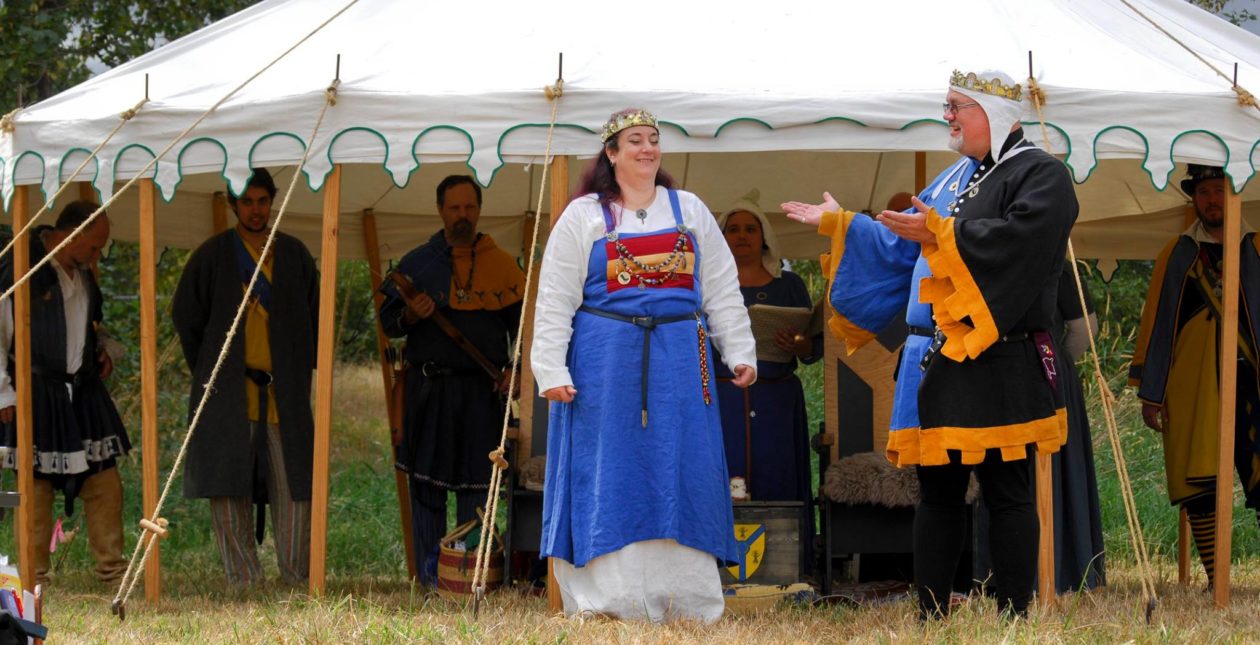We’re almost there now, only a couple of steps remain–
A Kingdom Requirement
Per Kingdom Events Policy (Autocrat is the older term for what we now call “Event Steward.”)
3. Autocrat:
The proposed autocrat shall be a member in good standing with the Society of Creative Anachronism and must maintain their membership until the close of the event.
This will provide an additional level of insurance coverage under the SCA’s Officers and Directors policy.
Autocrats must have access (either directly or through a deputy) to the Internet and email, as a large portion of communication with Kingdom and the populace is accomplished in this medium.
The proposed autocrat shall be selected and confirmed by the sponsoring branch as an acceptable representative of the branch.
The Council of the Exchequer shall confirm the acceptability of the proposed autocrat when they accept the Event Bid.
Previous experience with event management shall be considered valid criteria when reviewing the qualifications of a proposed autocrat.
Should the proposed autocrat lack sufficient experience, the Kingdom Seneschal may require the sponsoring branch to supply a consulting autocrat.
The proposed consulting autocrat shall be subject to the same requirements as the proposed autocrat.
Selling Your Event
Now you are going to attend the officers’ meeting, and persuade the folks there that Wyewood needs, wants, and can afford to sponsor this event.
This is best done by coming to the meeting organized, with your notebook and copies of the event bid to pass around, able to answer questions about the site, your plans and your personnel, and with a confident attitude.
80% of the information about the bid can be covered in the Kingdom Event Proposal Form.
You may wonder why this step is necessary, and why don’t you just bring up your bid at the regular business meeting.
There are several reasons for this and most of them are for your benefit.
One is that an event steward, by definition, is for the duration a deputy seneschal.
The seneschal will need to feel confident that you can be relied on to do the job right, and may have some questions for you.
If you’re like most people, you’d probably prefer to answer these in a less public setting.
It is possible that, in spite of all your best efforts, something important might have been left out of your event bid plans.
Again, you’d probably rather discover this in private than in public.
The other officers will likely have questions for you as well, but there shouldn’t be too many, as you have, of course, already talked to them in the course of putting your bid together.
Suggestions on the format may be made, and things may need to be changed, particularly the profit margin figures or the number of activities offered.
Remember that staying flexible is good; everyone there wants us to have a successful event.
Think of this as a final polishing of your bid, to get it into the best shape to present to Wyewood as a whole.
Let’s assume that all goes well, as it probably will–the officers feel that they can support this event, the seneschal gives the final OK and we can afford it.
Now the bid will be brought up at the business meeting the following week.
As you will recall from reading the Financial Policy, an event bid (or any other request for money) must be brought up at a business meeting and considered for approval or denial at the next month’s meeting (now you understand one of the reasons for that long lead time.)
Those present at the first business meeting may, sometimes, decide to waive this requirement, but it’s not wise to count on this.
You need to be at this meeting, or if something dire happens to you at least a member of your event steward team.
Once again, questions are likely to be asked.
The branch members present will vote on whether or not to accept the bid, and if it goes well, you’re in.
This is also a good time to find out if members of Wyewood are willing to participate.
Continue – Final Strech
- Guide for Event Stewards Getting Started
- Guide for Event Stewards Event Details
- Guide for Event Stewards – Getting Event Approved
- Guide for Event Stewards Final Details
